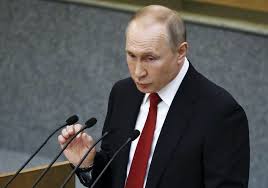Russian lawmakers move to keep Putin in power past 2024

Moscow: Russian lawmakers gave rapidly rubber-stamped sweeping constitutional changes that could keep President Vladimir Putin in power until 2036.
If Putin won and completed two more terms as president, it would make him the ruler of Russia for 36 years — longer than any other leader in its modern history.
The measure must still be approved by the country’s Constitutional Court and by a nationwide vote next month before they come into force. Putin’s critics called for protests, condemning the move as a way to keep him in office after he hits his term limit in 2024.
The Kremlin-controlled lower house, the State Duma, endorsed a set of amendments to the Russian Constitution and a provision that resets the term count for Putin once the revisions come into force. It passed the chamber by a 383-0 vote with 43 abstentions, and several hours later sailed through the upper house, the Federation Council, by a vote of 160-1 with three abstentions.
It is unclear when the Constitutional Court will rule, but a nationwide vote on the proposed amendments is set for April 22.
The 67-year-old former KGB officer has ruled Russia for more than 20 years, becoming the country’s longest-serving ruler since Soviet dictator Josef Stalin, who was in power for 29 years.
After serving two consecutive four-year terms — a limit outlined in the current constitution — Putin shifted to the prime minister’s seat in 2008, with close ally Dmitry Medvedev becoming a placeholder president.
The length of the presidency was extended to six years under Medvedev, and in 2012 Putin returned to the Kremlin as president. In 2018, he was re-elected for another six years.
Putin has weathered multiple international storms during his tenure. The 2014 annexation of Ukraine’s Crimean Peninsula boosted his approval ratings that have remained high despite Russia’s economic troubles amid a showdown with the West.
Putin has used those tensions to consolidate support at home and strengthen his image as a strong leader standing up to foreign pressure.
The constitutional amendment was proposed Tuesday by lawmaker Valentina Tereshkova, a former Soviet cosmonaut who was the first woman in space in 1963.
The measure restarts Putin’s term to zero, once it is up in 2024. It would allow him to run for president twice more after that, if he chooses.
The review of the provision by the Constitutional Court is widely seen as a formality.
Resetting term limits allows Putin to avoid becoming a lame duck, helping him rein in political elites who were nervous about who would succeed him.
“It’s important to prevent the elites running into different directions in the search for successor,” said Moscow-based political analyst Ekaterina Schulmann.
Other constitutional changes further strengthen the presidency and emphasize the priority of Russian law over international norms — a provision reflecting the Kremlin’s irritation with the European Court for Human Rights and other international bodies that have often issued verdicts against Russia. The changes also outlaw same-sex marriage and mention “a belief in God” as one of Russia’s traditional values.





